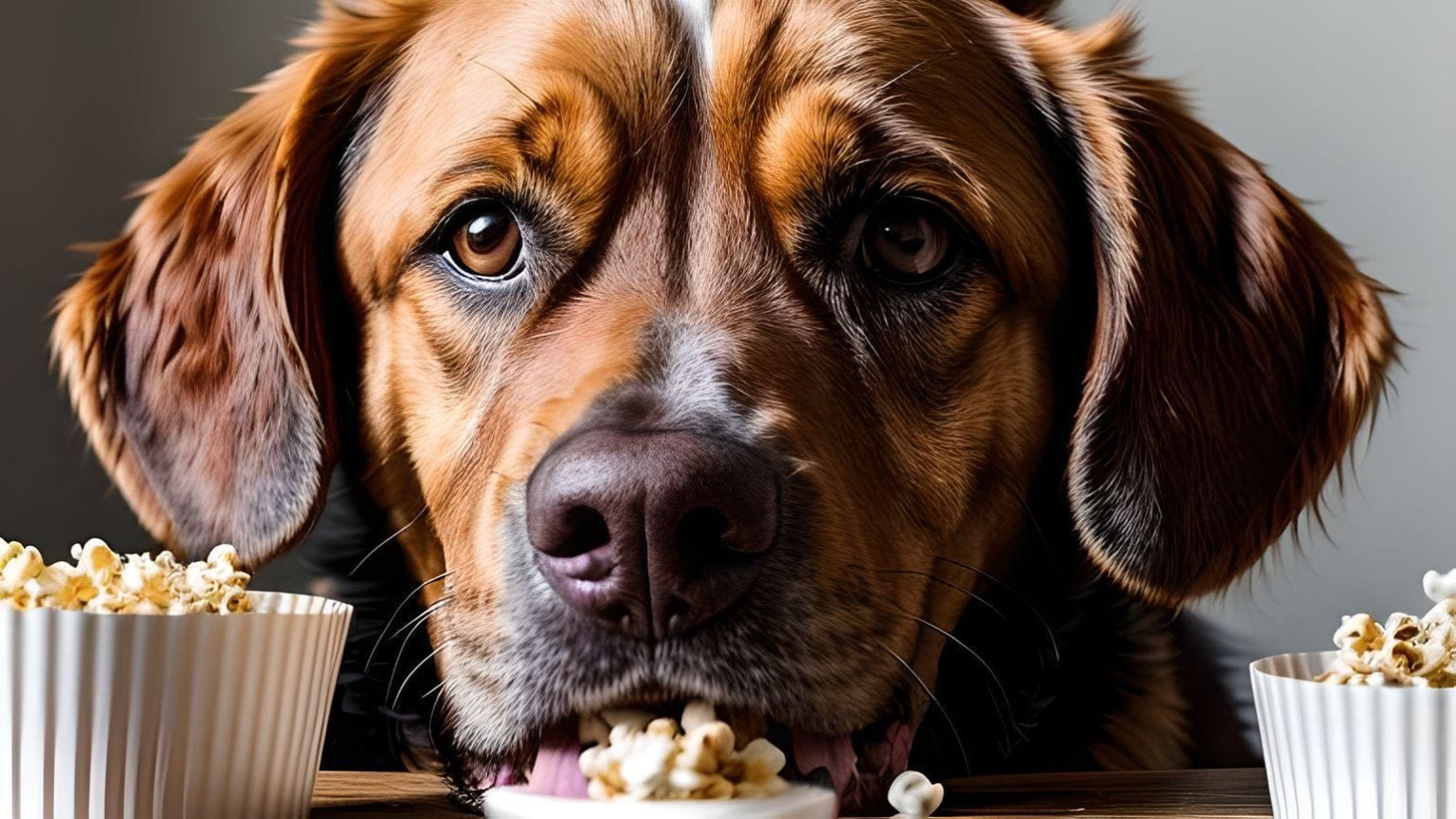Can Dogs Eat Popcorn | Is it Safe? 4 Benefits, Safety, Health Issues
Popcorn, with its irresistible crunch and versatility, is a favored snack for many. Whether it’s at the movies, during a relaxing evening at home, or a party, popcorn finds its way into our snacking routines. However, for dog owners, the question often arises: Can dogs eat popcorn? In this extensive 6000-word guide, we will leave no kernel unturned as we explore the nutritional aspects of popcorn, its potential benefits and risks for dogs, and provide detailed guidelines for safely sharing popcorn with your canine companion.
Unraveling Popcorn’s Nutritional Profile
Understanding the nutritional composition of popcorn is a crucial first step in determining its suitability for dogs. Let’s take a closer look at what makes up this popular snack:

1. Carbohydrates
Popcorn predominantly consists of carbohydrates, making up approximately 77% of its weight. These carbohydrates are mainly in the form of starch, providing a readily available source of energy. While dogs primarily require protein and fats for their energy needs, carbohydrates can still offer a source of readily available fuel for their active lifestyles.
2. Dietary Fiber
Popcorn boasts a relatively high dietary fiber content, accounting for roughly 15% of its weight. Dietary fiber is essential for digestion and aids in maintaining regular bowel movements. It provides bulk to the stool, which can be particularly beneficial for dogs with constipation issues or those that need assistance in maintaining healthy gastrointestinal function.
3. Protein
While not a significant source of protein, popcorn still contains a modest 3-4% of its weight as protein. This protein content, while relatively low, contributes to popcorn’s overall nutritional value for dogs. It can provide a small additional protein boost to their diet.
4. Fats
Popcorn is remarkably low in fat, typically containing only 1-2% of its weight in fat. This low-fat content makes it an attractive option for those who are cautious about their dog’s fat intake. High-fat diets can contribute to obesity, pancreatitis, and other health issues in dogs, so snacks like popcorn can be a better alternative for occasional indulgence.
5. Micronutrients
Popcorn does offer some micronutrients in the form of vitamins and minerals. These include B vitamins like niacin and folate, which are essential for metabolism and overall health. Additionally, popcorn provides trace minerals such as magnesium and phosphorus, which contribute to various physiological processes in the body. These micronutrients can be beneficial as part of a balanced diet for your dog.
Can Dogs Eat Popcorn
Yes, dogs can eat plain, air-popped popcorn in moderation. Popcorn can be a low-calorie and fiber-rich snack for dogs, and many dogs enjoy the light, crunchy texture. However, there are some important considerations to keep in mind:
- No Butter or Seasonings: Plain, unsalted, and unbuttered popcorn is the only type that should be given to dogs. Butter, oil, salt, and various seasonings used in microwave or movie theater popcorn can be harmful to dogs.
- Avoid Flavored or Pre-Packaged Popcorn: Stay away from flavored or pre-packaged popcorn, as these often contain artificial additives, preservatives, and flavorings that are not suitable for dogs.
- Watch for Unpopped Kernels: Always be cautious of unpopped kernels, as they can pose a choking hazard. Make sure to remove any unpopped kernels from the portion you give to your dog.
- Portion Control: While popcorn is a light snack, it should be offered in small quantities as an occasional treat. Excessive consumption can lead to digestive upset or unnecessary weight gain.
- Watch for Allergies: As with any new food, it’s important to monitor your dog for any adverse reactions when introducing popcorn into their diet. Some dogs may be sensitive to corn or grains.
- Air-Popped Only: Ensure that the popcorn is air-popped without any added oils or fats. While a small amount of plain, air-popped popcorn is okay, added oils and fats can contribute to obesity and digestive issues in dogs.

Can Dogs Eat Caramel Popcorn?
Caramel popcorn is a treat best reserved exclusively for human consumption. This sweet and sticky snack is made by coating popcorn with caramelized sugar, often with added ingredients like butter and flavorings. While it may be a delightful indulgence for us, it poses several risks to dogs. Caramel contains sugar, which can be harmful to dogs and lead to weight gain and dental issues. Additionally, the butter and other additives used can be unhealthy. It’s best to steer clear of sharing caramel popcorn with your furry friend.
Can Dogs Eat Buttered Popcorn?
Buttered popcorn is another popcorn variety that is not suitable for dogs. The butter used in popcorn is often high in fats, and it may contain seasonings that can be unhealthy for dogs. Furthermore, the salt content in buttered popcorn is a concern, as excessive salt intake can lead to sodium ion poisoning in dogs. Symptoms of sodium ion poisoning include increased thirst, diarrhea, vomiting, and potentially more severe health problems. For these reasons, it’s best to avoid sharing buttered popcorn with your pet.
Can Dogs Eat Popcorn Kernels?
Popcorn kernels are best kept away from dogs entirely. These unpopped kernels pose a significant choking hazard, and there’s also the risk of your dog breaking a tooth when attempting to chew on a kernel. To ensure your dog’s safety and prevent dental injuries, it’s important to remove and discard unpopped kernels and only offer fully popped, air-popped popcorn to your pet.
Can Dogs Eat Popcorn Shrimp?
Popcorn shrimp is not a safe choice for dogs. Typically found in fried seafood dishes, it’s heavily breaded, deep-fried, and seasoned, making it a less-than-ideal option for canine consumption. The breading and seasonings may contain additives that are not healthy for dogs, and the oils used for frying can be problematic. Additionally, the size and shape of popcorn shrimp can pose a choking hazard. To ensure your dog’s health and safety, it’s best to avoid sharing popcorn shrimp or any fried seafood with your pet.
Can Dogs Eat Popcorn With Salt?
Popcorn with added salt is not advisable for dogs. Excessive salt intake can lead to sodium ion poisoning, a condition that may result in symptoms such as increased thirst, diarrhea, vomiting, and even more severe health issues. It’s important to avoid offering salted popcorn to your dog and to prioritize their health by sticking to plain, air-popped popcorn without added salt or seasonings.
Can Dogs Eat White Cheddar Popcorn?
White cheddar popcorn, like other flavored popcorn varieties, is not recommended for dogs. The cheddar flavorings and seasonings may contain ingredients that are unhealthy or potentially toxic to dogs. It’s best to choose plain, unseasoned popcorn for your pet and to avoid sharing flavored varieties.
Can Dogs Eat Microwave Popcorn?
Microwave popcorn is typically not a safe choice for dogs. Many varieties are flavored with artificial additives, oils, and seasonings that are not suitable for their diet. Some of these additives may even be toxic. To prioritize your dog’s health, it’s important to offer plain, air-popped popcorn without flavorings or additives, and to avoid sharing microwave popcorn with your pet.
Can Dogs Eat Skinny Pop Popcorn?
Skinny Pop popcorn, while often considered a healthier snack option for humans, may still contain seasonings and flavorings that are not suitable for dogs. It’s best to choose plain, air-popped popcorn without any added ingredients if you want to share a snack with your pet. Ensuring that the popcorn is unseasoned and free from artificial additives will help maintain your dog’s well-being.

Can Dogs Eat Cheddar Popcorn?
Cheddar popcorn, like other flavored popcorn varieties, is generally not a safe choice for dogs. The cheddar flavorings and seasonings used in this type of popcorn can contain ingredients that are unhealthy or potentially harmful to dogs. For the well-being of your pet, it’s recommended to offer plain, unseasoned popcorn and avoid sharing flavored varieties.
Can Dogs Eat Smartfood Popcorn?
Smartfood popcorn, known for its cheddar flavor, is not a recommended option for dogs. The cheddar flavorings and other additives in this type of popcorn are not suitable for your pet’s diet. To prioritize your dog’s health and safety, it’s best to offer plain, unseasoned popcorn in moderation and avoid sharing flavored popcorn varieties.
Can Dogs Eat Popcorn Safely?
Now that we have examined popcorn’s nutritional makeup, let’s delve into whether it’s safe for dogs to indulge in this popular snack:
1. Plain, Air-Popped Popcorn
Plain, air-popped popcorn is generally considered safe for dogs when offered in moderation. This type of popcorn is the ideal choice because it is devoid of harmful additives like salt, butter, or artificial flavorings. The simplicity of plain, air-popped popcorn ensures that your dog is not exposed to potentially unhealthy ingredients.
2. Buttered Popcorn
Buttered popcorn should be strictly off the menu for dogs. The high-fat content in butter can lead to gastrointestinal distress and may contribute to obesity in dogs. Furthermore, many butter-flavored popcorns contain artificial additives and seasonings that can be harmful to your pet’s health.
3. Salted Popcorn
High sodium content in salted popcorn can be detrimental to dogs. Excessive salt intake can result in sodium ion poisoning, leading to symptoms such as excessive thirst, vomiting, diarrhea, and even seizures. Therefore, it’s best to avoid sharing salted popcorn with your furry companion.
4. Flavored Popcorn
Flavored popcorn varieties, such as cheese or caramel popcorn, often contain additional ingredients that are unsafe for dogs. These can include cheese powder, sugars, and artificial flavorings, all of which should be avoided.
5. Microwave Popcorn
Microwave popcorn should also be approached with caution. Besides potentially harmful additives and artificial flavorings, the bags themselves may contain chemicals that could be hazardous to dogs if ingested. It’s advisable to steer clear of microwave popcorn when sharing with your pet.
The Potential Benefits of Feeding Popcorn to Dogs
While popcorn should be given to dogs sparingly and with precautions, it does offer some potential benefits when used as an occasional treat:

1. Low in Calories
Air-popped popcorn’s low-calorie nature can be advantageous for dogs on calorie-restricted diets or those prone to obesity. It allows for a satisfying snack without excessive calorie intake.
2. Source of Dietary Fiber
The fiber content in popcorn can assist in digestion and promote regular bowel movements in dogs. This is particularly beneficial for dogs with constipation issues.
3. Mental Stimulation
Offering plain popcorn to your dog can provide mental stimulation and enrichment. The act of catching and chewing the popcorn can be an enjoyable and engaging activity for your canine companion.
4. Bonding and Training
Using small, plain popcorn pieces as training rewards can be an effective way to reinforce positive behaviors in dogs and strengthen the bond between you and your pet.
Potential Risks of Feeding Popcorn to Dogs
While there are potential benefits to feeding popcorn to dogs, it’s crucial to be aware of the associated risks:

1. Choking Hazard
Popcorn kernels can pose a choking hazard, especially for small breeds or dogs with dental issues. It’s essential always to ensure that the popcorn is fully popped and broken into small, manageable pieces before offering it to your dog.
2. Unpopped Kernels
Unpopped kernels, colloquially referred to as “old maids” or “duds,” are extremely hard and can potentially damage your dog’s teeth if bitten into. They also present a choking risk.
3. Butter and Salt
Buttered or salted popcorn can lead to digestive upset, including diarrhea, in dogs. The high-fat content in butter can be particularly problematic.
4. Additives and Flavorings
Flavored popcorn varieties often contain artificial additives and flavorings that can be harmful to dogs. To minimize these risks, opt for plain, air-popped popcorn.
5. Allergies
Some dogs may be allergic to corn. If you’re introducing popcorn to your dog’s diet for the first time, watch for signs of allergic reactions, such as itching, hives, or gastrointestinal issues.
Guidelines for Safely Sharing Popcorn with Your Dog
If you decide to share popcorn with your dog, it’s essential to follow these guidelines to ensure their safety:
1. Use Plain, Air-Popped Popcorn
Stick exclusively to plain, air-popped popcorn without any additives, butter, salt, or artificial flavorings.
2. Break It into Small Pieces
Before offering popcorn to your dog, make sure to break it into small, bite-sized pieces to minimize the risk of choking.
3. Supervise Your Dog
Always supervise your dog while they’re enjoying their popcorn treat to ensure they don’t attempt to swallow it whole or encounter any unpopped kernels.
4. Limit the Quantity
Popcorn should only be an occasional treat for dogs. It should never replace their regular diet and should be given in moderation.
5. Watch for Allergic Reactions
If it’s your dog’s first time trying popcorn, monitor them closely for any signs of allergies or digestive upset.
6. Consult Your Vet
If you have any concerns about whether popcorn is suitable for your dog, consult your veterinarian for personalized advice based on your dog’s specific health and dietary needs.
Conclusion:
In conclusion, dogs can enjoy popcorn as an occasional treat, but it must be plain and air-popped, free from butter, salt, and artificial flavorings. While popcorn can offer some benefits, such as being low in calories and a source of dietary fiber, it also comes with potential risks, including choking hazards and digestive issues. Always prioritize your dog’s safety and well-being when sharing treats with them, and consult
your veterinarian if you have any concerns about your dog’s diet. By following these guidelines, you can safely enjoy some popcorn with your canine companion on those special occasions when you want to share a snack. Remember, a little popcorn can go a long way in enhancing the joy and bonding between you and your furry friend.
Frequently Asked Questions:
-
Can Dogs Eat Popcorn?
Yes, dogs can eat popcorn, but with some important caveats. Plain, air-popped popcorn is generally safe for dogs when given in moderation. It’s crucial to avoid buttered, salted, or flavored popcorn, as these varieties can contain ingredients that are harmful to dogs.
-
Is Popcorn Healthy for Dogs?
Popcorn can offer some health benefits for dogs when given in moderation. It’s low in calories and a source of dietary fiber, which can aid in digestion and regular bowel movements. However, it should not replace their regular diet, and portion control is essential.
-
What Are the Risks of Dogs Eating Popcorn?
The primary risks of dogs eating popcorn include choking hazards from unpopped kernels, digestive upset from butter or salt, and potential allergic reactions to corn. Additionally, some flavored popcorns contain additives that can be harmful to dogs.
-
Can Dogs Choke on Popcorn?
Yes, dogs can choke on popcorn, especially if they attempt to swallow it whole or encounter unpopped kernels. To reduce the risk of choking, always break popcorn into small pieces before giving it to your dog and supervise them while they eat.
-
How Much Popcorn Can I Give My Dog?
Popcorn should only be given to dogs as an occasional treat. The quantity should be limited, and it should not make up a significant portion of their daily calorie intake. The appropriate amount depends on your dog’s size and dietary needs, but generally, a few pieces are sufficient.
-
Can Puppies Eat Popcorn?
Puppies have delicate digestive systems, and their nutritional needs are different from adult dogs. It’s best to avoid giving popcorn to puppies, especially before they have fully developed teeth. Consult your veterinarian for suitable treats for your puppy.
-
How Should I Prepare Popcorn for My Dog?
To prepare popcorn for your dog, choose plain, air-popped popcorn without any additives or seasonings. Break it into small, bite-sized pieces to reduce the risk of choking, and make sure it’s cool before offering it to your pet.
-
My Dog Has an Allergic Reaction to Popcorn. What Should I Do?
If you suspect that your dog is having an allergic reaction to popcorn, such as itching, hives, or gastrointestinal issues, stop giving them popcorn immediately. Contact your veterinarian for guidance on managing the allergic reaction and identifying the specific allergen.
-
Can Dogs Eat Popcorn Every Day?
No, dogs should not eat popcorn every day. While plain, air-popped popcorn can be an occasional treat, it should not become a regular part of their diet. Too much popcorn can lead to health issues, including obesity and digestive problems.
-
Are There Alternatives to Popcorn for Dog Treats?
Yes, there are many dog-friendly alternatives to popcorn as treats. You can consider offering your dog small pieces of fruits like apple or banana, vegetables like carrots or green beans, or commercially available dog treats formulated for their dietary needs. Always check with your vet for suitable treat options for your specific dog.
Recommended:
Can Dogs Eat Cheese | Is it Good? Health Issues, 5 Risks, Care Tips
Can Dogs Eat Cantaloupe: A Comprehensive Guide to Cantaloupe and Canine Nutrition





























